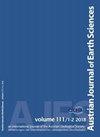岩石学地质力学与弹性关系的编码模型概念及其在高寒岩石测井资料中的应用
IF 1.1
4区 地球科学
Q2 Earth and Planetary Sciences
引用次数: 2
摘要
从弹性性质推导地质力学性质,如岩石强度,不仅是石油工业的一个重要课题,也是地热工程、隧道或采矿的一个重要课题。它是决定井眼稳定性、钻速或地下矿山稳定性的关键参数之一。为了研究砂岩、石灰石、硬石膏和石膏的纵波速度与单轴抗压强度之间的关系,提出了应用岩石学模型概念的想法,其中包括额外的矿物学影响。该模型的第一步是定义或假设致密宿主材料的固体基质特性,因此涵盖了岩石类型/岩性的影响。第二步使用包含模型实现断裂/裂纹。样品分别取自地表和钻孔。开发了一种新的测量装置,用于测量单轴压缩试验中的速度。并对导出的方程在测井资料上的应用进行了验证。采用岩石学编码模型概念所提出的相关性显示出良好的初步结果。利用岩石学编码模型概念(包裹体和缺陷模型),可以推导出单轴抗压强度与纵波速度的相关性。推导出的方程可以很容易地应用于测井数据,也可以很好地计算井内单轴抗压强度。岩土力学参数,弹性力学参数,弹性力学参数,弹性力学参数,弹性力学参数,弹性力学参数,弹性力学参数,弹性力学参数,弹性力学参数,弹性力学参数Ölindustrie,弹性力学参数,弹性力学参数Ölindustrie,弹性力学参数,弹性力学参数Ölindustrie,弹性力学参数,弹性力学参数,弹性力学参数,弹性力学参数,弹性力学参数,弹性力学参数,弹性力学参数,弹性力学参数,弹性力学参数,弹性力学参数,弹性力学参数,弹性力学参数,弹性力学参数,弹性力学参数,弹性力学参数,弹性力学参数,弹性力学参数,弹性力学参数,弹性力学参数,弹性力学参数,弹性力学参数,弹性力学参数。Es ist eine der Kerngrößen fgr die Stabilität des Bohrlochs, der Bohrgeschwindigkeit oder der Stabilität eines Untertagebergbaues。岩石学研究进展:岩石动力学研究进展:岩石动力学研究进展:岩石动力学研究进展:岩石动力学研究进展:岩石动力学研究进展:岩石动力学研究进展:岩石动力学研究进展:岩石动力学研究进展;岩石动力学研究进展:岩石动力学研究进展;岩石动力学研究进展:岩石动力学研究进展;Der erste Schritt dieses Models ist, die Matrixwerte von Der dechten materialmass, welche den Einfluss des Gesteinstyps/ Der Lithologie beinhalet, zu beestimmen Der和zunehmen。Der zweite Schritt implementiert Risse/ br本文章由计算机程序翻译,如有差异,请以英文原文为准。
Petrographic coded model concept for the correlation between geomechanical and elastic properties and its application on log data for Alpine rocks
The derivation of geomechanical properties, like the rock strength, from elastic properties is an important topic not only in the oil industry, but also for geothermal projects, tunnelling or mining. It is one of the crucial parameters for the stability of the borehole, the drilling rate or stability of an underground mine. The idea of applying the petrographic model concept which involves an additional mineralogical influence was developed for the correlation between compressional wave velocity and uniaxial compression strength for sandstone, limestone, anhydrite and gypsum. The first step of this model is to define or assume the solid matrix properties of the dense host material, which covers therefore the influence of the rock type/lithology. The second step implements fractures/cracks with an inclusion model. Samples are selected from the surface and from borehole. A newly measurement set-up was developed to measure velocities during the uniaxial compression test. Additionally, the application of the derived equations on log data is tested. The presented correlations using the petrographic coded model concept shows good first results. Correlation between uniaxial compression strength and compressional wave velocity can be derived using the petrographic coded model concept (inclusion and defect model). The derived equations can easily be applied on log data and also deliver good results for the uniaxial compression strength in the borehole. Die Ableitung geomechanischer Parameter, wie die Gesteinsfestigkeit, von elastischen Eigenschaften, ist nicht nur in der Ölindustrie, sondern auch für Geothermie Projekte, im Tunnelbau oder im Bergbau, von großem Interesse. Es ist eine der Kerngrößen für die Stabilität des Bohrlochs, der Bohrgeschwindigkeit oder der Stabilität eines Untertagebergbaues. Die Idee der Anwendung des petrographisch kodierten Modelkonzeptes, welches zusätzlich den Mineraleinfluss beinhaltet, wurde für die Korrelation zwischen Kompressionswellengeschwindigkeit und einaxialer Druckfestigkeit für Sandstein, Kalkstein, Anhydrit und Gips entwickelt. Der erste Schritt dieses Models ist es, die Matrixwerte von der dichten Materialmasse, welche den Einfluss des Gesteinstyps/der Lithologie beinhaltet, zu bestimmen oder anzunehmen. Der zweite Schritt implementiert Risse/Brüche mit einem Inklusionsmodel. Es wurden Oberflächenproben und Bohrkerne ausgewählt. Ein neuer Messaufbau wurde entwickelt um Geschwindigkeiten währen eines einaxialen Druckversuches zu messen. Zusätzlich wurde die Anwendung der abgeleiteten Gleichungen an Bohrlochdaten getestet. Die hier präsentierten Korrelationen unter Verwendung des petrographisch kodierten Models zeigen erste gute Ergebnisse. Korrelationen zwischen einaxialer Druckfestigkeit und Kompressionswellengeschwindigkeit können mit dem Model (Inklusionen und Defekt Model) abgeleitet werden. Die Gleichungen können weiter leicht an Bohrlochdaten angewendet werden und erste Ergebnisse liefern gute Werte für die einaxiale Druckfestigkeit im Bohrloch. _______________________________________________________________ ________________________________________ Austrian Journal of Earth Sciences Vienna DOI: 10.17738/ajes.2017.0007 Petrographic coded model concept for the correlation between geomechanical and elastic properties and its application on log data for Alpine rocks__________________________________________ 1)*) 2) 3) Nina GEGENHUBER , Thomas SCHIFKO & Gerhard PITTINO 1) Montanuniversitaet Leoben, Chair of Applied Geophysics, Franz-Josef-Strasse 18, 8700 Leoben, Austria; 2) Fugro Austria GmbH, Einoedstrasse 13, 8600 Bruck an der Mur, Austria; 3) Montanuniversitaet Leoben, Chair of Subsurface Engineering, Franz-Josef-Strasse 18, 8700 Leoben, Austria; *) Corresponding author, nina.gegenhuber@unileoben.ac.at uniaixal compression strength; compressional wave velocity; petrographic code; logging data; alpine rocks
求助全文
通过发布文献求助,成功后即可免费获取论文全文。
去求助
来源期刊

Austrian Journal of Earth Sciences
Earth and Planetary Sciences-Paleontology
CiteScore
3.10
自引率
0.00%
发文量
0
审稿时长
>12 weeks
期刊介绍:
AUSTRIAN JOURNAL OF EARTH SCIENCES is the official journal of the Austrian Geological, Mineralogical and Palaeontological Societies, hosted by a country that is famous for its spectacular mountains that are the birthplace for many geological and mineralogical concepts in modern Earth science.
AUSTRIAN JOURNAL OF EARTH SCIENCE focuses on all aspects relevant to the geosciences of the Alps, Bohemian Massif and surrounding areas. Contributions on other regions are welcome if they embed their findings into a conceptual framework that relates the contribution to Alpine-type orogens and Alpine regions in general, and are thus relevant to an international audience. Contributions are subject to peer review and editorial control according to SCI guidelines to ensure that the required standard of scientific excellence is maintained.
 求助内容:
求助内容: 应助结果提醒方式:
应助结果提醒方式:


